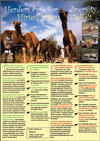Booklet on endogenous livestock development

Endogenous livestock development means putting small-scale livestock keepers and pastoralists at the centre of their own development. It means building on what they already do, and supporting their initiatives to improve their livelihoods, instead of imposing “solutions” from outside.
LPP and the Endogenous Livestock Development Network have published a 24-page booklet outlining the endogenous livestock development approach and introducing the ELD Network.
Download booklet (786 kb)
Visit the Endogenous Livestock Development Network
Herders care for biodiversity

Every month, one more livestock breed becomes extinct…

This 8-page booklet and accompanying poster, published by the League for Pastoral Peoples and Endogenous Livestock Development and the LIFE Network, highlight the issues and offer some solutions.
Download booklet 393 kb (in English)
Download poster 423 kb (in English and German)
The bright side of livestock

The United Nations continues to see pastoralism as a main reason for desertification, says Drynet, a global initiative on drylands. But a large number of scientific studies contradict this, and instead show the positive effects of pastoralism as a land-use strategy.
LPP’s Ilse Koehler-Rollefson and Silke Brehm have collated some of the bright aspects of pastoralism.
- Go to the previous page
- 1
- …
- 60
- 61
- 62
- 63
- 64
- 65
- 66
- …
- 86
- Go to the next page
